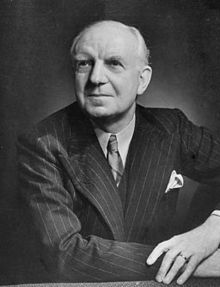Frederick Marquis, 1st Earl of Woolton
|
The Right Honourable The Earl of Woolton CH PC |
|
|---|---|
 |
|
| Lord President of the Council | |
|
In office 28 May – 27 July 1945 |
|
| Monarch | George VI |
| Prime Minister | Winston Churchill |
| Preceded by | Clement Attlee |
| Succeeded by | Herbert Morrison |
|
In office 28 October 1951 – 24 November 1952 |
|
| Monarch |
George VI Elizabeth II |
| Prime Minister | Winston Churchill |
| Preceded by | The Viscount Addison |
| Succeeded by | The Marquess of Salisbury |
| Chancellor of the Duchy of Lancaster | |
|
In office 24 November 1952 – 20 December 1955 |
|
| Monarch | Elizabeth II |
| Prime Minister |
Winston Churchill Anthony Eden |
| Preceded by | The Viscount Swinton |
| Succeeded by | The Earl of Selkirk |
| Personal details | |
| Born |
Frederick James Marquis 23 August 1883 Ordsall, Salford, Lancashire, England |
| Died | 14 December 1964 (aged 81) Arundel, Sussex, England |
| Nationality | English |
| Political party | Conservative |
| Alma mater | Victoria University of Manchester |
| Occupation | Businessman, politician |
Frederick James Marquis, 1st Earl of Woolton, CH, PC (23 August 1883 – 14 December 1964) was an English businessman, statesman and politician. A successful department store director and wartime Minister of Food, Lord Woolton became Conservative Party Chairman from 1946 to 1955. He rebuilt the local organisations with an emphasis on membership, money and a unified national propaganda appeal on critical issues. To broaden the base of potential candidates, the national party provided financial aid to candidates, and assisted the local organisations in raising local money. Woolton also proposed changing the name of the party to the Union Party, but when that suggestion fell on deaf ears he instead emphasised a rhetoric that characterised opponents as "Socialist" rather than "Labour". He is given significant credit for the Conservative victory in 1951, their first since 1935.
Lord Woolton was born at 163 West Park Street in Ordsall, Salford, Lancashire, in 1883 to Thomas Robert Marquis (died 1944) and his wife, Margaret Marquis née Ormerod. Educated at Manchester Grammar School and the University of Manchester (where he was a Research Fellow), Woolton was an active member of the Unitarian Church. He was active in social work in Liverpool (1906–1918)
He was an executive of Lewis's department store in Liverpool (1928–1951), becoming Managing Director. He was knighted in 1935 and was awarded a peerage in 1939 for his contribution to British industry. Despite his wishes, he was informed that it was not possible to be Baron Marquis (because "Marquess", or "Marquis", is another grade of the peerage of the United Kingdom) and so he took the title Baron Woolton after the Liverpool suburb of that name in which he had lived. He subsequently served on a number of government committees (including the Cadman committee). He refused to affiliate himself with any political party.
...
Wikipedia
